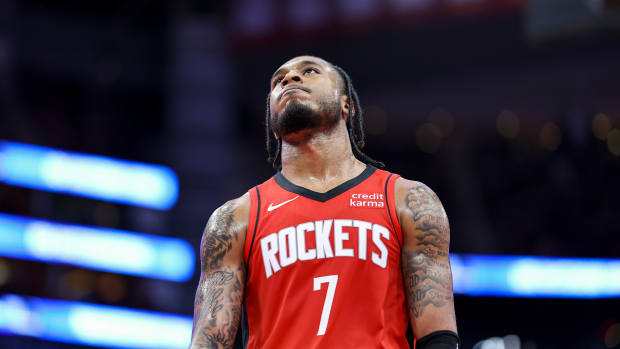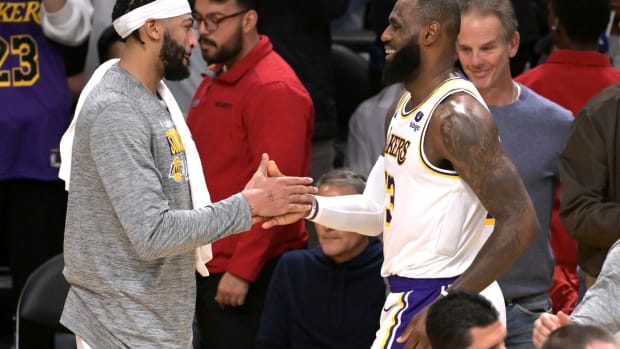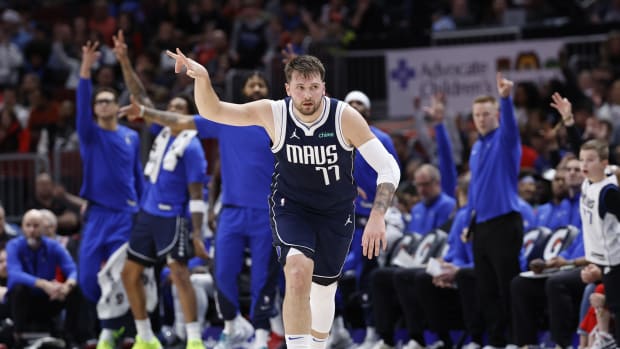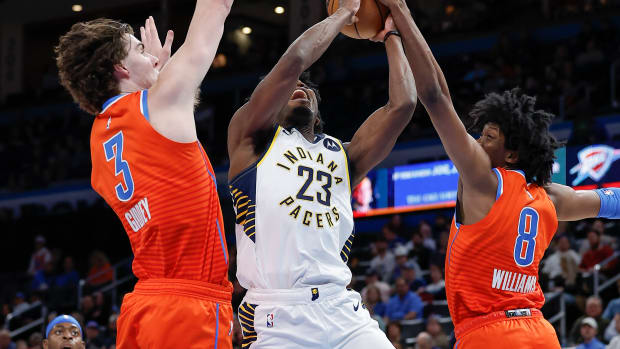The Zion Williamson Injury That Stopped the Sports World
DURHAM, N.C. — UNC-Duke at Cameron Indoor Stadium is typically a showcase for everything that's great about sports, but 30 seconds into the game Wednesday, millions of people watched the inverse of that story. With luminaries like President Barack Obama and Spike Lee in attendance, Zion Williamson crumbled to the floor in pain. When he left the court his absence overshadowed the game itself, and for a few hours, a nightmare scenario for Duke basketball became the biggest story in sports. As teammate Cam Reddish said afterward, "It was a freak accident."
First, what happened: Williamson slipped near the foul line of Duke's basket, his Nike shoe exploded from the force of his leg's wayward momentum, and a second later he was on the ground, grabbing at his knee. He was able to hobble off under his own power, but he didn't return to the game, and after a brief stop on the sidelines, he disappeared to the locker room for the rest of the night. The good news, initially, is that the injury appears to be minor.
Duke coach Mike Krzyzewski said afterward that Williamson's knee is "stable" and he deemed it a mild knee sprain. "It sucks," said freshman forward R.J. Barrett. "I hope he's OK. He slipped and broke out [of] the shoe at the same time. I didn't really know what [happened]. But I hope he gets better."
"It puts everyone in a state of trying to figure it out," Krzyzewski said of his team's reaction during the game. "I thought our guys really played hard in the first half. We regrouped. Then the second half, I think the realization that he's not there kind of stunned us. We were horrible to start the [second] half."
In the end, Duke could never recover. Once Williamson left the game, North Carolina dominated on the inside and finished the first half with 34 points in the paint, on 17 of 24 shooting. By halftime, the Tar Heels had built a double-digit lead that was never relinquished. Carolina's senior big men, Luke Maye and Cameron Johnson, combined for 56 points on 60 percent shooting in the 88–72 win.
But the story was Zion. He's the presumptive No. 1 pick in the NBA draft, and one of the biggest names in sports at the moment. Duke–UNC was almost certainly a bucket–list item for Obama, but Zion is probably why he showed up this year. And Obama wasn't the only one who wanted to be there. Tickets for Wednesday's game were reportedly being sold on the secondary market for nearly $4,000. As for everyone at home: football is over, the NBA is still on its All-Star break this week, and Duke-UNC was the biggest game in sports this week. ESPN had been promoting it for several days.
So what emerged in the aftermath of the Zion injury wasn't really tragic—because he seems to be OK—but it was incredibly strange. What happens when the biggest game in America becomes dominated by the player who left after 30 seconds?
For one, after 48 hours of news stories about Duke-UNC ticket prices, there were natural conclusions drawn about the injustice of Zion performing as an unpaid amateur and suffering an injury while almost everyone else in the college sports ecosystem was able to get rich off the game. That argument makes some sense. College athletes should obviously be able to profit if there's money available, and while schools paying players directly would be complicated for a variety of reasons, there would be plenty of third parties willing to sponsor one year of college for a player like Zion. In other words: regardless of logistics for athletic departments around the country, Nike would pay Zion right this minute if they could, and they should be able to.
And why does Zion Williamson have to be in college at all? That's an NBA problem. As Nuggets guard Isaiah Thomas tweeted of the NBA's age limit, "Let these kids go straight out of HS!!! Too much on the line to be messing with college if you got a legit chance to turn pro. One injury can change somebody career, Zion sit yo ass down lol and we will be ready for you in the big boy league." That neatly summarizes an argument that won't disappears anytime soon. If players are talented enough to be drafted into the NBA after high school, many around the sport think they should be able to make that transition as soon as they graduate.
At the same time, though, each of the arguments above elide some nuance. Regarding the injustice of college athletics: While there's no good argument against Zion earning high six figures in endorsement money this season, it's a mistake to argue that he hasn't benefited at all. He'll be leaving the Duke basketball platform exponentially more famous than when he arrived, and some of that fame will help him capitalize in endorsements at the next level. Likewise, while Barrett was seen as the superior NBA prospect for all of their high school careers, Zion's dominance in college has guaranteed him a spot at the top of his draft class and marked him for stardom at the next level. In the meantime, he's spent the entire year looking like he's having the time of his life. While others would decry the college experience on his behalf, I'm not sure he would agree.
As for the NBA's age limit, that's a longer conversation, but lowering the age limit to 18 years old would create an economic imperative for most star high schoolers. They would have a choice to turn pro, yes. And maybe it's a choice they deserve. But we should be clear that financial sanity will make the choice inevitable for most of them; the risk of college injury and the benefits of starting a rookie-scale contract as soon as possible will be too great for most prospects to ignore. So while it's probably true that Zion could have turned pro and thrived, a lower age limit would have likely meant that his fellow freshmen in Wednesday's game -- R.J. Barrett, Nassir Little, and Cameron Reddish -- also would have turned pro. Would that have been good for the long-term career prospects of those players and others like them? Would it have been good for the NBA, and the teams that drafted them?
And speaking of unaswerable questions: the Zion injury also prompted many internet users to wonder what role Nike's shoes may have played in the injury. There was one deleted joke from Puma, Buffalo Wild Wings weighed in to offer support, and thousands of other tweets continued all night. At one point, the Action Network's Darren Rovell wondered if there would be a dip in Nike's stock price tomorrow. At Sports Illustrated, our own Michael McCann explored potential liability claims that Duke or Zion could bring against Nike.
"Who knows," Krzyzewski said of the Nike shoe's role in the injury. "I've seen guys bust through shoes, but not sprain their knee. I mean the shoe burst. I don't know if he had already [sprained his knee]. Maybe how he fell [exploded the shoe]. I don't know."
“We are obviously concerned and want to wish Zion a speedy recovery," a Nike spokesman said late Wednesday night. "The quality and performance of our products are of utmost importance. While this is an isolated occurrence, we are working to identify the issue.”
All of these shoe thoughts ignore the most important takeaway, of course: Zion slipped and his shoe exploded. His sad Paul George signature shoe was like Bo Jackson's bat, or the pigeon that got in the way of Randy Johnson's fastball. One day, when Zion is healthy again and back to dunking his way through the entire sport, we are going to look back shocked at the night that he awkwardly planted his pivot foot and it ended with a shoe literally tearing itself in half.
That kind of power is ultimately why people cared so much this week. Zion is unlike any athlete we've ever seen on a basketball court, and he's captured imaginations all over basketball and beyond. "When kid is bigger than everyone but also faster than everyone," said one NBA scout before the game Wednesday, "that only happens in middle school. And with Zion."
All of that is why Williamson will be the No. 1 pick in June. Wednesday night won't change that story; instead, the conversations surrounding the Duke-UNC game underscored exactly how much fraught energy is encompassed in the margins of the story for any superstar amateur basketball player today. There are great expectations, there are millions invested, there are thousands of takes, and the stakes are highest for the people who are paid nothing.
Now the question is whether Zion will return to the court and risk injury for the rest of this season. Krzyzewski expressed optimism about Zion's ability to return healthy this season, but he said the timetable is uncertain. The team will gameplan for Saturday's Syracuse game under the assumption that the biggest star in college basketball won't be playing. "Hopefully he'll be back playing sometime in the near future," Krzyzewski said. "That's where we're at."


































